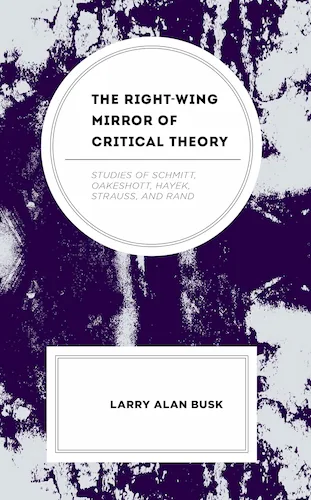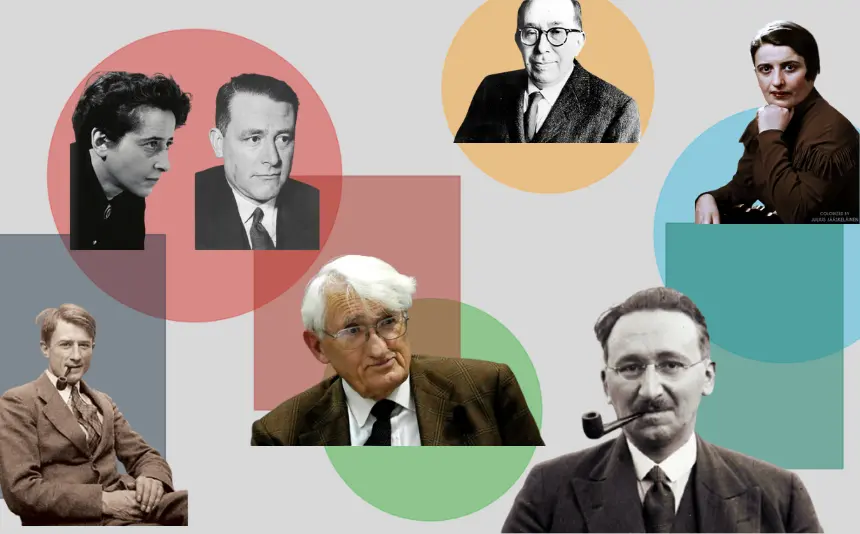The most influential philosophers today are Right-wing philosophers. If this sounds incorrect, it is probably because we are operating with a specific understanding of “influence.” I do not mean that Right-wing philosophers are the most frequently cited in academic journal articles, or that their works are often taught in University seminars.
Margaret Thatcher carried F.A. Hayek’s The Constitution of Liberty in her briefcase. Paul Ryan preferred The Road to Serfdom, and provided copies of that seminal reactionary text – along with Ayn Rand’s Atlas Shrugged – to his entire congressional staff. The second George Bush administration was peopled with direct and indirect pupils of Leo Strauss. The coup de grâce, however, is Alan Greenspan, the early convert to Randian “objectivism” who was chair of the Federal Reserve Bank of the United States – arguably the most powerful position mentioned so far – for nearly two decades.
The cataclysmic unfolding of the climate crisis and the specter of ecological collapse make rehabilitating the project of constructing a rational society all the more urgent.
I never laid eyes on Hayek, Strauss, or Rand during my graduate education in philosophy, even though I specialized in twentieth century political thought. Instead, I was assigned figures like Jürgen Habermas, Michel Foucault, and Hannah Arendt. So, while the world we live in was molded in accordance with Right-wing visions, I buried my head in theory with little clout or currency in the realm of actually existing politics.
It is almost impossible to fathom a British Prime Minister or an American Speaker of the House being a confessed Foucauldian. Could we imagine conversations at the International Monetary Fund invoking Habermas, Arendt, or even John Rawls?
This curious disconnect between the world and the world of political theory continues in full force today: our newly minted Vice President is strongly influenced by the “postliberal” political theorist Patrick Deneen, but how many graduate students have even heard of Deneen?
Addressing this lacuna was one of the principal motivations behind The Right-Wing Mirror of Critical Theory. Upon actually reading the likes of Hayek and Strauss – along with other Right-wing luminaries such as Carl Schmitt and Michael Oakeshott – I was struck by something more notable and more troubling: the arguments sounded eerily familiar.
A Critique of “Intelligent Design” in Politics
In the conversations that dominate the “critical” and “radical” domains of political theory, “The Enlightenment” and “Modernity” are often cast in the role of villains. From genealogy and deconstruction to newer developments in “decolonial” and “radical democratic” thought, the notion that human societies could or should be intelligently designed in accordance with “reason” is construed as naïve, problematic, or even genocidal.
From a different vantage point, Arendt also rejected the idea that politics was about constructing a “good” or “rational” society. This renders political action a means to achieving a definite and pre-determined end, rather than a performative end-in-itself ultimately rooted in the exchange of opinions.
Even Habermas and Axel Honneth, ostensible defenders of Enlightenment and Modernity, reconfigure these categories so as to make them unrecognizable. No longer about universal emancipation or the economic organization of society (which Habermas dismisses as “the production paradigm”), “rationalization” concerns only communication, mutual understanding, or recognition.
Implicitly or explicitly, all of these accounts center on the figure of difference. The political world is made up of different peoples, different histories, different interests, different opinions, different worldviews, different ontological paradigms. The pretensions of Jean-Jacques Rousseau’s “general will,” Karl Marx’s universal class, or Julius Nyerere’s appeals to “deliberate design” must therefore appear as hubristic at best and dangerous at worst. Better to embrace one form or another of “pluralism” rather than cling to the outdated notion that we could create a “rational society.”
While I expected to find the classics of Right-wing thought populated by dogmatists, religious fanatics, or staunch believers in natural law, I was surprised to discover arguments remarkably similar – at times almost indistinguishable – from the disposition described above, one that was supposed to be progressive, liberatory, and resistant to authority.
Who’s Afraid of the Rational Society?
Like your favorite “postmodern” or “post-structuralist” philosopher, Schmitt rejected foundationalism in political thinking. The universalist humanism of the Enlightenment project, he argued, would rob the political of its meaning: the demarcation between “friend” and “enemy.” He likewise declined to provide any normative justification for who should count as a friend or an enemy.
For Schmitt, it is not a question of discovering the “right” or “true” politics, but only which politics is more successful at securing order and stability. The myths of “the nation” or “the Volk” have more emotional resonance – and thus more organizing power – than “the global proletariat” or “humankind.” He was very concerned about how universalist thinking erased differences, insisting that political theory be rooted in the relationship between specific “peoples” and specific places.
Hayek does not defend free markets based on a strong belief in the metaphysical inviolability of private property rights.
Oakeshott spent his theoretical life inveighing against what he alternatively called “rationalism” and “the politics of faith.” In his late work, On Human Conduct, he distills his criticism by drawing a distinction between “enterprise association” and “civil association.” An enterprise association has a concrete and agreed-upon end: a fire department’s goal is to put out fires. So, debates about the most rational way to accomplish this goal make sense.
A civil association, however, is only a collection of people living under the same jurisdictional roof. There is no agreed-upon goal. Therefore, theorizing about the most “rational” way to organize society as a whole is pointless. A civil association can only be managed in better or worse ways by minimizing conflict as much as possible.
The error of the “rationalist,” according to Oakeshott, is to mistake the logic of civil association (unrelated households coexisting side-by-side) for that of enterprise association (an elective, goal-directed undertaking). The totalitarian terrors of the twentieth century were born when “rationalists” tried to impose their pet “enterprises” on everyone else in the civil association.
Schmitt’s embrace of fascism is not random, but linear and coherent.
Hayek is well-known for his defense of free markets against state supervision, but his stated arguments for this position are epistemological rather than moral. His critique of economic planning is rooted in an understanding of limitations: even the most well-informed and well-intentioned central planner could never account for and anticipate the shifting and dynamic desires of multitudes of people. The decentralized competitive market, however, produces a “spontaneous order.” Cribbing a line from Adam Ferguson, Hayek describes this as the result of “human action” but not “human design.”
On a more philosophical level, it is noteworthy that Hayek does not defend free markets based on a strong belief in the metaphysical inviolability of private property rights. Like Schmitt and Oakeshott, he does not believe that normative commitments can be rationally justified in this way.

Rather, he adopts an “evolutionary” (using this word) metric for comparative political analysis. Nations with a capitalist economy and Christian cultural mores grew rich and powerful, while others did not. The former must have been doing something right. Rather than ask for justifications or explanations, we should defer uncritically to whatever economic forms and moral rules allowed the West to flourish.
Political orders, like languages, developed over centuries through innumerable modifications and adaptations. This was a largely unconscious process, opaque even to its own participants: there is no reason that “will not” became “won’t” – it simply did. It is folly to presume that we could ever take a bird’s eye view and “rationally design” a society, just as intentionally created languages (like Esperanto) never quite get off the ground.
The core of Hayek’s work, then, is not the philosophical anthropology of homo economicus (a concept from the classical tradition that he emphatically rejects). Quite the opposite, it is a testament to the limits of human reason and understanding.
Unlike the other figures, Strauss believes that a model for a truly just political order is discernible by rational reflection. He denies, however, that this model could ever be realized in practice – because the masses are not capable of rational reflection. Philosophers and intellectuals can theorize “the good,” but they should never hope to see their visions actualized. The multitude of common folk would not understand or accept what is good for them, so let them cling to their illusions provided they leave the cognoscenti alone to do their contemplative business. Strauss’s position is elitist but not vanguardist.
A Mirror Image
Reading the greatest hits of the twentieth century Right, several motifs from contemporary critical and radical theory should be familiar:
- the emphasis on formal aspects of “the political” and “place-based” thinking
- the rejection of foundationalism and universalism
- the eschewal of the cognitive in favor of the affective or aesthetic
- the ceaseless critiques of vanguardism
- the depoliticization of market economics
- the insistence on pluralism, difference, epistemological limits, and self-reflective opacity
By itself, this striking resemblance is interesting but perhaps not altogether alarming. The central argument of the book, however, is that if we accept this theoretical disposition, then there are in fact compelling reasons to adopt Right-wing political positions.
Schmitt’s embrace of fascism is not random, but linear and coherent. Since there is no “correct” politics accessible to reason, we can only maintain stability by uniting people around whatever myths have the most resonance – “the authentic people” and “the nation.” For the myth to be effective, it is essential to maintain and emphasize differences between peoples and nations, rather than dissolving particularistic identities in an abstract universal humanity.
Oakeshott casts aspersions on women’s enfranchisement. This is a shockingly conservative position to our contemporary ears, but it follows neatly from his philosophical premises. Doubling the size of the electorate is radical and unprecedented, going against the grain of centuries of tradition. The suffragettes imposed the pet project of their “enterprise association,” supported by nothing but a counterfactual idea about gender equality that “civil association” was never designed to enact.
Similar conclusions follow from the premises of Hayek and Strauss. Theorists on the progressive-Left side of the spectrum, however, are not able to make a strong and consistent connection between the formal architecture of their theory and the content of their political commitments. They disavow the notion of a “correct” politics while simultaneously adhering violently to what Right-wing critics call “political correctness.”
Why shouldn’t a “pluralism” of worldviews include vaccine skeptics or Holocaust deniers? Why shouldn’t we celebrate crowds of people chanting “mass deportation now!” as a return of “the political”? What gives us the right to decide, contrary to centuries of tradition and established custom, that people should be able to change their personal pronouns? When a congressman defends his view on abortion by claiming that sexual assault cannot lead to pregnancy, should we concede that our own certitudes are limited and that our grasp on “the truth” is as fractured and partial as his? Do we fancy ourselves an enlightened vanguard?
It is my contention that we cannot offer meaningful answers to these questions without implicitly reintroducing those “Enlightenment,” “Modernist” categories that have ostensibly been banished from critical and radical thought. It is on this level that theorists of the Left can distinguish themselves from figures like Schmitt and Hayek, rather than agreeing on the philosophical essentials and only differing with them politically for idiosyncratic and arbitrary reasons.
The outlier here is Rand, who affirms rationalist foundationalism and universalist humanism in sharp contrast with the others. Rather than indicating the limits of reason in politics, however, Rand’s work only confirms the importance of “rationalist” categories. We do not need to confront her position with criticisms of foundationalism or universalism. As I detail in the last chapter of the book, her writings are absurd even according to her own standards. It is not the standards themselves that are problematic, but her abject failure to apply them consistently.
Critical Theory on a Warming Planet
The cataclysmic unfolding of the climate crisis and the specter of ecological collapse make rehabilitating the project of constructing a rational society all the more urgent. In the face of this unprecedented catastrophe, concepts like vanguardism, universal emancipation, and the conscious organization of production no longer appear so quaint.
While Mike Davis correctly notes that rapid decarbonization and the transition to a sustainable economy would require “a revolution of almost mythic magnitude,” Foucault advises us to “turn away from all projects that claim to be global or radical.” Perhaps it is instead time to turn away from all projects that share the core commitments of the Right.









